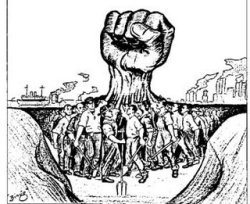Over My Shoulder #22: from Barbara Leon, “Consequences of the Conditioning Line,” from Feminist Revolution (1975)
Pick a quote of one or more paragraphs from something you’ve read, in print, over the course of the past week. (It should be something you’ve actually read, and not something that you’ve
read
a page of just in order to be able to post your favorite quote.)Avoid commentary above and beyond a couple sentences, more as context-setting or a sort of caption for the text than as a discussion.
Quoting a passage doesn’t entail endorsement of what’s said in it. You may agree or you may not. Whether you do isn’t really the point of the exercise anyway.
Here’s the quote. This is from Barbara Leon’s essay, Consequences of the Conditioning Line in Feminist Revolution, the 1975 anthology by the Redstockings.
Consequences of the Conditioning Line
The issue of psychological interpretation of behavior has been one of the major ideological divisions between Redstockings and other groups in the women’s liberation movement. While other groups have argued that women submit to their own oppression due to past training, brainwashing, or programming, Redstockings said:
We reject the idea that women consent to or are to blame for their own oppression. Women’s submission is not the result of brainwashing, stupidity or mental illness but of continual, daily pressure from men. We do not need to change ourselves, but to change men. —Manifesto, July 7, 1969
What other groups saw as submissive behavior, Redstockings saw as ways women, when still struggling individually, fight for what they want given their situation.
Judith Hole and Ellen Levine, in their book Rebirth of Feminism, have asserted that it was this position of Redstockings, adopted as the
pro-woman line, along with an overemphasis on consciousness-raising, which led to the groups dissolution in 1970:In the view of many feminists the
anti-brainwashing/pro-woman position leads not only to a paralysis of action–what external changes in behavior can a woman effect if her behavior is understood only as a rational response to the social system–but also to a paralysis of thought. Although Redstocking’s rejection of traditionally-accepted psychological expanations of women’s behavior does offer new insights, one former member of the group has argued,When you begin to believe the pro-woman line, it distorts your perception of reality. It’s too simplistic.—Rebirth of Feminism, p. 172Left out from the book was the pro-woman line’s prescription for collective action and political strategy. Also wrong was its conclusion as to the harmful effects of Redstockings’ anti-brainwashing theory on the history of the group. Redstockings was temporarily halted by the same problems which Hole and Levine ascribe to other women’s liberation groups, most notably attacks on leadership from within and without the group. In fact, the accuracy and importance of the pro-woman line has become more evident with recent developments.
What began, to some extent, as an analysis of women’s behavior in our personal and emotional lives now appears to have even larger political significance as we see the active use of psychological theories to deny women jobs under capitalism and to explain away the continued oppression of women in socialist countries. In both cases, women are told, failure to advance is caused by women’s lack of self-confidence and clinging to traditional roles. This blocks any real analysis of the roots of male supremacy and the continued use of power to keep women in a subordinate position. The capitalist’s self-interest requires that he maintain segregation in order to pay women less and in this way depress the level of all wages. In the case of the socialist, there are conflicting interests. On the one hand, the unpaid services provided by women as wives and mothers have great economic value and raise the standard of living of male workers. On the other hand, men’s opportunism in oppressing women detracts from the united power of the working class.
Brainwashing and Women: The Psychological Attack, which I wrote in the Spring of 1970, outlined the basic position that the
newpsychological theories used in some parts of the women’s liberation movement–theories that women are brainwashed or conditioned into inferiority–are just a more sophisticated version of the old theories of women’s biological inferiority. As in the following quote from Marcuse,natureis simply replaced bysecond nature:… over and above the obviously physiological differences between male and female, the feminine characteristics are socially conditioned. However, the long process of thousands of years of social conditioning means that they may become
second naturewhich is not changed automatically by the establishment of new social institutions. There can be discrimination against women even under socialism.–H. Marcuse, lecture 3/7/74, Stanford UniversityThese theories shift the burden of blame from men to women, obscuring the power differences between men and women, and preventing us from clearly seeing just what the barriers are that have to be overcome–barriers that exist not in our heads but in the real world. My article stressed the punishment given to women who step out of line. It did not go into another important way in which men exercise their power to enforce the status quo–rewarding women for good behavior. Nor did it go into the use of myth and lies promoted by the powerful to deny us access to real information and collective knowledge. This was not simply an oversight. At the time the article was written there was tremendous opposition to the idea that force was ever used against women at all.
Carol Hanisch’s article, published in the July-August 1973 issue of Woman’s World, introduces the idea that conditioning is seen as making women unqualified–an idea that has taken on great economic significance as the newest justification for keeping women out of jobs. She shows that
sex roletheory as well asconditioningis used as a cover up for oppression. She also analyzes why psychological theories are used by women in the movement, what they get out of defining the problems in this way. Thus, this article, written a year later, begins to take on the political problem of female opportunism and the interests and misconceptions behind it.Colette Price points out how the conditioning arguments used in the women’s movement are an ironic retreat even from the theories of establishment behavioral psychologists.
By the Fall of 1972, the situation in this country had changed somewhat. Women’s liberation had become a mass movement and the establishment in this country was forced to change its words, if not its practices. In Feminist Art Journal Patricia Mainardi reported on a television interview with William Rubin, Chief Curator of New York’s Museum of Modern Art, in which Rubin used the acceptable rhetoric of liberal
feminismas an excuse for not recognizing and showing the work of women artists.To describe women as culturally or psychologically inferior is untrue, as well as being an insult, as the early radical feminists discovered. To say that this alleged inferiority makes us unqualified for taking on jobs or positions of power is worse, because economic survival as well as respect is involved. This is the full significance of the
psychological attack. At every level of society it presents analysis (contrary to the opposite charge of Hole and Levine) and in practical terms blocks the advancement of women. Within the movement, it can be used to discredit anything women say we want. It isn’t necessary to argue over goals, desires or impressions if you can write off thebrainwashedwomen expressing them. Women’s legitimate demands for love and commitment from men, for example, have often been dismissed in this way. Outside the movement, in the job and educational world, real issues can be similarly avoided. It isn’t necessary for an employer or a university to admit to excluding women if he can simply say that no qualified women have applied–or even that none exist at this point in history due to the past effects of sexism. It isn’t necessary for socialist governments to challenge their own backwardness and lack of class perspective regarding half their people if they can instead point to thebackwardnessof the female population.Psychology versus power, then, is not an abstract intellectual argument. It is important because the content of your theory determines the content of your action. How you define what is wrong determines how you will try to solve the problem. How much you are allowed to question determines how much you will be allowed to change.
–Barbara Leon, Consequences of the Conditioning Line, from Feminist Revolution: An Abridged Edition with Additional Writings (1975/1979), pp. 66–67.



 It might not seem like a poetry reading from Rudyard Kipling is the most promising way to commemorate ongoing events in South Asia. But, by jingo, he did
It might not seem like a poetry reading from Rudyard Kipling is the most promising way to commemorate ongoing events in South Asia. But, by jingo, he did